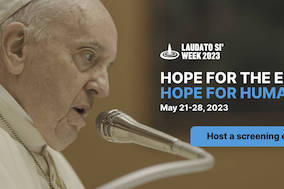Hexham and Newcastle: Homily for Laudato Si Week by Fr Chris Hughes

Fr Chris Hughes
On 23 May, Bishop Robert Byrne of Hexham and Newcastle held a special Mass focusing on creation care at St Mary's Cathedral. Fr Chris Hughes, member of the Diocesan Justice and Peace Council and Chair of the Diocesan Environmental Group, gave the Homily on 'Hearing the Cry of the Poor and the Earth'. Music was provided by pupils from Sacred Heart High School, Fenham.
In my role as the Chair of the Diocesan Environmental Group, there are a number of 'thank-yous' that I would like to give. First of all, I am grateful to Bishop Robert for being willing to preside at the Mass. My thanks also to Canon Simon Lerch and Fr William Nichol, Colleen and all the Cathedral Parish Community for being willing to host the Mass. My thanks to all the servers, sacristans, stewards, organist and others of the parish who have been so helpful and welcoming. A very big thank-you to Maria and her colleagues at Sacred Heart and to all the members of the choir who have been so generous with their time and talents. It is great to see you all. Thankyou to you all for coming out tonight taking part in this Mass.
My final set of thanks is to fellow members of the Diocesan Environmental Group. I was skiving off while most of the preparation was being done for the Mass. So, I am very grateful to you all for all the work and effort you have put in.
Since this is the first time the group has organised this Mass for Laudato Week it would be good to introduce you to the rest of the group. Unfortunately, Mark Maughan from CAFOD, Hannah Bartlett from the Youth Ministry Team and Rev Deacon Richard McLaughlin are not able to be with us this evening. But I can introduce you to Claire Hetherington from the Diocesan Education Department, Minnie Fraser who is a member of the Diocesan Property Department and is the Diocesan Environmental Lead and Chris Myers, who taught environmental Science at Northumbria University; also Mel Lawless who is also a part of Youth Ministry Team. Finally, two other members are here on the sanctuary, the Bishop and Fr Adrian Tuckwell. The Diocesan Education Department comes under what seems the ever-expanding umbrella of Caritas.
In the Gospel Christ tells us that he will send us the Advocate, the Spirit, during his absence. The Greek for 'advocate' is 'parakletos', so you can see where the word 'paraclete 'comes from. It literally means to CRY OUT TO THOSE WHO CRY OUT!! The Spirt is crying out the voice of God in response to the cries of our world.
Sadly, there are many cries. At this time, we have the cries of all victims of war and violence. We think of the victims, the dead, injured and bereaved in Ukraine, Yemen, Sri Lanka, Israel/Palestine, Burma and so many other places. Their cries are not just of violence but will also be the trauma that will last for decades. We must here the words of Pope Francis in Fratelli Tutti, 'No More War!'
We have the cries of victims of racial hatred who are made to feel worthless and outsiders. They are often the scapegoats for fear and discrimination for those who seek to maintain their power, wealth and status. We must hear their cries.
There is the cry of hunger of people from across the world; people starving, living on subsistence diets. That includes people in our own country who may also feel the cry of the cold after the summer as families decide to eat or heat or parents starve to feed their children.
Finally, we have the cry of the Earth, experienced through increased global warning, more extreme weather events, raging fires, increased extinctions of species, and the Earth becoming as Pope Francis said in Laudato Si, a huge pile of filth.
These cries cannot be ignored. In Fratelli Tutti, in his reflection on the Good Samaritan which we will hear on a Sunday in July, Pope Francis states that we cannot pass-by. Like the Smartian we must attend to the cries we hear and also like him respond in a way that meets the needs of the situation.
Our responses will need to be on different levels.
In terms of decreasing our carbon footprint, time is running out. Our lifestyles all have to change. We all have to take responsibility. It will impact at all levels, from the individual to the global, including the diocese. Cutting fossil fuels means an embrace of new technologies, such as ground pumps, electric vehicles, embracing the power of wind and tide.
But it cannot be just a question of embracing new technologies. Indeed, in Laudato Si Pope Francis wants to avoid the 'technocratic mindset' that sees everything like machine. We do not simply need more machines to fix the problem
We have to go deeper. In Fratelli Tutti Pope Francis calls for a 'political love'. This is a love that not only makes a compassionate response to the needs around us but asks us to explore the causes of these injustices. Francis talks of a "commanded" love, expressed in those acts of charity that spur people to create more sound institutions, more just regulations, more supportive structures
We need to address the causes and not just symptoms. In my experience of being involved with Community Organising and Tyne Wear Citizens, I have seen how members of Civic Society can come together to challenge big State or big money. This can be done through our building of relational power to bring about change, such as increase the number living wage employers, improve mental health services especially for young people, tackle hate crime and misogyny. We must not be frightened in being political to ensure that power is used for the common good and to uphold the dignity and value of others. I have seen that using the power we have in developing civic society, we can transform our world.
But we still need to go deeper, since I sense the problem we face is a spiritual issue with the human condition and as members of the Church we have the solution that has always been part of our tradition. This was brought home to me when reading Patrick Deneen's 'Why Liberalism has failed'.
He makes the point that the understanding of liberty and freedom of modern liberalism is very different to classical or Christian understanding of this important aspect of our humanity. For the former, being free is about avoidance of any constraints. We are supposed to be able to do what we want, when we want and how we want, the only limit is that we do not harm others. While with the latter, being free meant being aware of and managing our appetites, passions and desires, since if we do not control them, then they will control us, totally curbing our liberty.
It is this collective, global encouragement of uncontrolled appetites, passions and desires that is crushing our fragile earth, seeing it as an object to plunder, which is putting immense pressure on our planet, which is the cause of so much destruction of what Francis states in Laudato Si as our 'common home'. This force is also the cause of so much violence, since it increases demand on limited resources, which is the root of so much conflict in our world. It is these forces that are the cause of increasing inequality and injustice, that make people hungry, abused and rejected.
We have to manage our own appetites, but the human soul can seem to be like a black hole of need. It is our God who shows his infinite love in the self-giving of Christ that meets the depth of this desire. As St Augustine famously said, 'my heart will not rest till it rests with thee'. It is only when the depth of our need is met by the depth of this divine love can we start to manage our own desires.
We need to hear the cries of others and our planet, but we also need to hear the cry of divine love. It is only when this divine cry touches the DNA of our souls that we can then truly hear those many cries that rage in our world. So, we must hear the cries of the poor and the Earth but also that cry of love from God for us all.


















